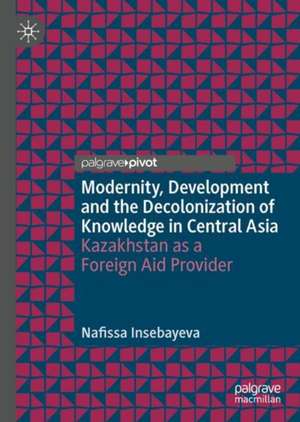Modernity, Development and Decolonization of Knowledge in Central Asia: Kazakhstan as a Foreign Aid Provider: Politics and History in Central Asia
Autor Nafissa Insebayevaen Limba Engleză Hardback – 5 ian 2022
Drawing on fieldwork in Nur-Sultan and Almaty (Kazakhstan) between 2016 and 2019, this research evaluates the philosophy and core features of Kazakhstan’s chosen development aid model and explains the factors that account for the construction of aid patterns of Kazakh donorship. This book will be of interest to scholars of Central Asia and the emerging politics of Eurasia as well as scholars of politics and aid.
Preț: 451.10 lei
Nou
Puncte Express: 677
Preț estimativ în valută:
86.33€ • 89.80$ • 71.27£
86.33€ • 89.80$ • 71.27£
Carte tipărită la comandă
Livrare economică 15-29 aprilie
Preluare comenzi: 021 569.72.76
Specificații
ISBN-13: 9789811651168
ISBN-10: 9811651167
Pagini: 110
Ilustrații: XI, 138 p. 11 illus., 2 illus. in color.
Dimensiuni: 148 x 210 mm
Greutate: 0.34 kg
Ediția:1st ed. 2022
Editura: Springer Nature Singapore
Colecția Palgrave Macmillan
Seria Politics and History in Central Asia
Locul publicării:Singapore, Singapore
ISBN-10: 9811651167
Pagini: 110
Ilustrații: XI, 138 p. 11 illus., 2 illus. in color.
Dimensiuni: 148 x 210 mm
Greutate: 0.34 kg
Ediția:1st ed. 2022
Editura: Springer Nature Singapore
Colecția Palgrave Macmillan
Seria Politics and History in Central Asia
Locul publicării:Singapore, Singapore
Cuprins
Introduction.- Setting the Stage for Research: Theoretical Approaches to Development.- The ‘Development’ Paradigm: Official Development Assistance and DAC.- Kazakhstan as a Humanitarian Aid Donor.- New Actors Through Old Lenses?.- In the Colonial Matrix of Power: The Aftermath of the Soviet Collapse.- Conclusion.
Recenzii
“Modernity, Development and Decolonization of Knowledge in Central Asia. Kazakhstan as a Foreign Aid Provider adds a discussion of Kazakhstani aid, a neglected topic, to the scholarly discourse on foreign aid. Nafissa Insebayeva explores Kazakhstan’s transition from a recipient country to a development aid provider. In doing so, she examines how Kazakhstan has constructed its development aid model, assessing its philosophy and main features … . I highly recommend the book” (Lamine Balde, Europe-Asia Studies, August 31, 2023)
Notă biografică
Nafissa Insebayeva specializes in Kazakhstan’s domestic politics, development cooperation and international development strategies. She holds a Ph.D. from the University of Tsukuba (Japan) and currently serves as a Researcher at the Nippon Foundation Central Asia-Japan Human Resource Development Project (NipCA).
Textul de pe ultima copertă
This book joins the discussion on foreign aid triggered by the rise of multiplicity of emerging donors in international development and explores the transformation of Kazakhstan from a recipient country to a development aid provider.
Drawing on fieldwork in Nur-Sultan and Almaty (Kazakhstan) between 2016 and 2019, this research evaluates the philosophy and core features of Kazakhstan’s chosen development aid model and explains the factors that account for the construction of aid patterns of Kazakh donorship. This book will be of interest to scholars of Central Asia and the emerging politics of Eurasia as well as scholars of politics and aid.
Drawing on fieldwork in Nur-Sultan and Almaty (Kazakhstan) between 2016 and 2019, this research evaluates the philosophy and core features of Kazakhstan’s chosen development aid model and explains the factors that account for the construction of aid patterns of Kazakh donorship. This book will be of interest to scholars of Central Asia and the emerging politics of Eurasia as well as scholars of politics and aid.
Nafissa Insebayeva specializes in Kazakhstan’s domestic politics, development cooperation and international development strategies. She holds a Ph.D. from the University of Tsukuba (Japan) and currently serves as a Researcher at the Nippon Foundation Central Asia-Japan Human Resource Development Project (NipCA).
Caracteristici
Explores the transformation of Kazakhstan Evaluates the philosophy of Kazakhstan Explains the factors that account for the construction of aid patterns








